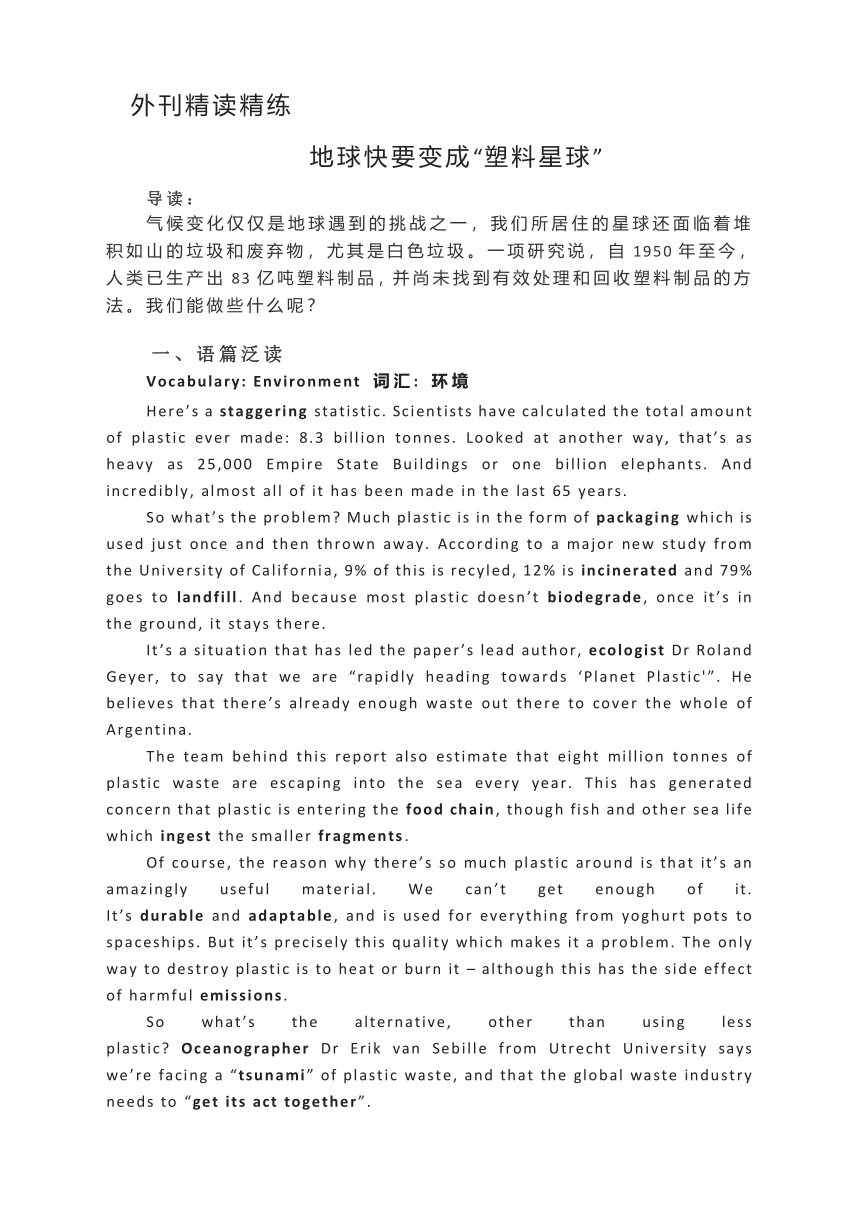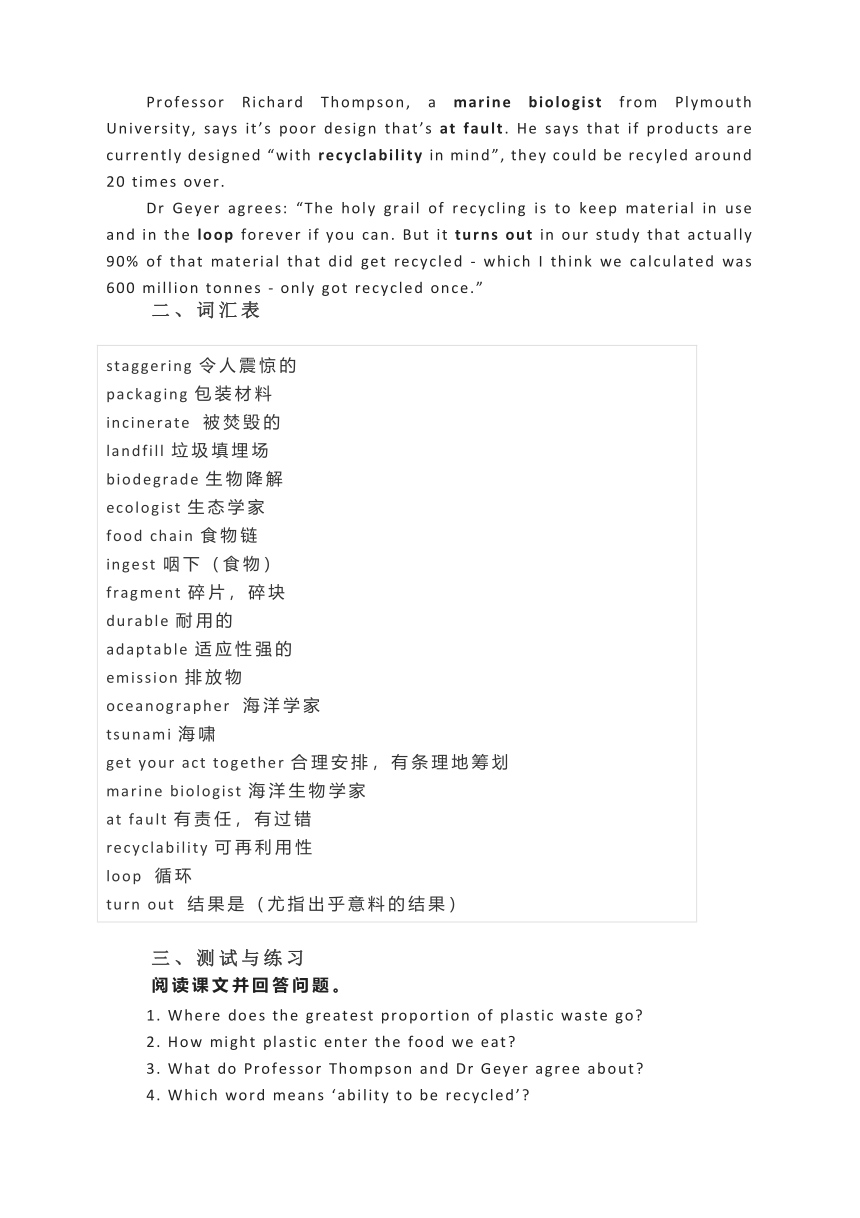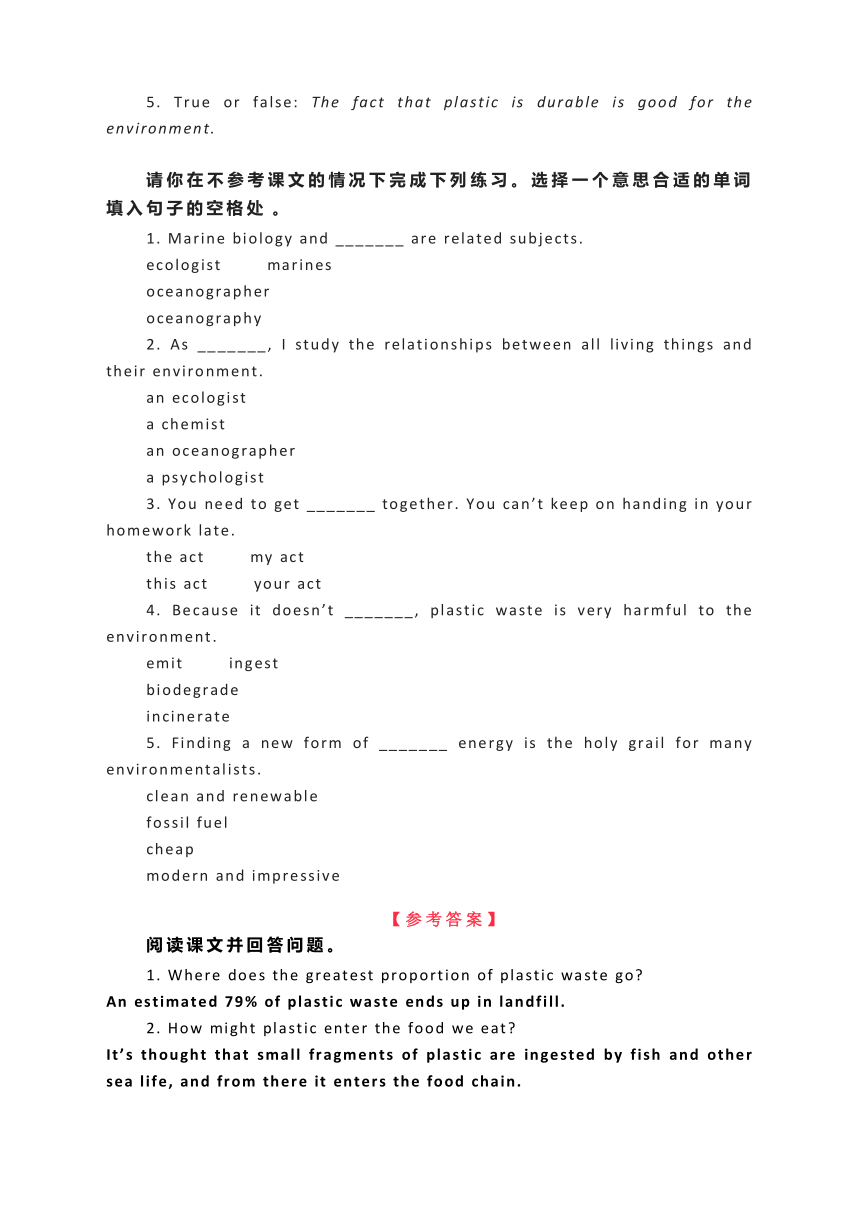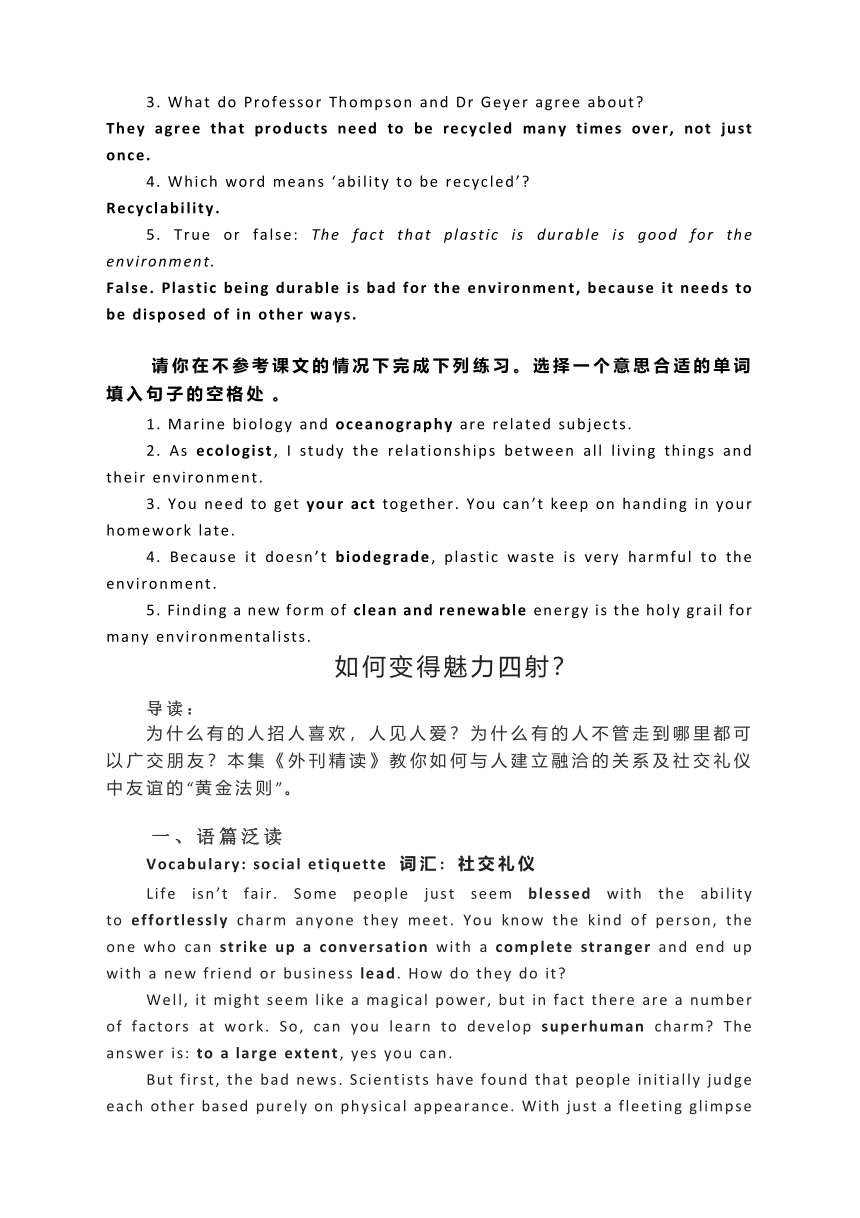2023届高三英语二轮复习地球快要变成“塑料星球”等2则外刊阅读训练
文档属性
| 名称 | 2023届高三英语二轮复习地球快要变成“塑料星球”等2则外刊阅读训练 |  | |
| 格式 | docx | ||
| 文件大小 | 27.1KB | ||
| 资源类型 | 教案 | ||
| 版本资源 | 通用版 | ||
| 科目 | 英语 | ||
| 更新时间 | 2023-03-27 09:21:27 | ||
图片预览




文档简介
外刊精读精练
地球快要变成“塑料星球”
导读:
气候变化仅仅是地球遇到的挑战之一,我们所居住的星球还面临着堆积如山的垃圾和废弃物,尤其是白色垃圾。一项研究说,自1950年至今,人类已生产出83亿吨塑料制品,并尚未找到有效处理和回收塑料制品的方法。我们能做些什么呢?
一、语篇泛读
Vocabulary: Environment 词汇: 环境
Here’s a staggering statistic. Scientists have calculated the total amount of plastic ever made: 8.3 billion tonnes. Looked at another way, that’s as heavy as 25,000 Empire State Buildings or one billion elephants. And incredibly, almost all of it has been made in the last 65 years.
So what’s the problem Much plastic is in the form of packaging which is used just once and then thrown away. According to a major new study from the University of California, 9% of this is recyled, 12% is incinerated and 79% goes to landfill. And because most plastic doesn’t biodegrade, once it’s in the ground, it stays there.
It’s a situation that has led the paper’s lead author, ecologist Dr Roland Geyer, to say that we are “rapidly heading towards ‘Planet Plastic'”. He believes that there’s already enough waste out there to cover the whole of Argentina.
The team behind this report also estimate that eight million tonnes of plastic waste are escaping into the sea every year. This has generated concern that plastic is entering the food chain, though fish and other sea life which ingest the smaller fragments.
Of course, the reason why there’s so much plastic around is that it’s an amazingly useful material. We can’t get enough of it. It’s durable and adaptable, and is used for everything from yoghurt pots to spaceships. But it’s precisely this quality which makes it a problem. The only way to destroy plastic is to heat or burn it – although this has the side effect of harmful emissions.
So what’s the alternative, other than using less plastic Oceanographer Dr Erik van Sebille from Utrecht University says we’re facing a “tsunami” of plastic waste, and that the global waste industry needs to “get its act together”.
Professor Richard Thompson, a marine biologist from Plymouth University, says it’s poor design that’s at fault. He says that if products are currently designed “with recyclability in mind”, they could be recyled around 20 times over.
Dr Geyer agrees: “The holy grail of recycling is to keep material in use and in the loop forever if you can. But it turns out in our study that actually 90% of that material that did get recycled - which I think we calculated was 600 million tonnes - only got recycled once.”
二、词汇表
staggering 令人震惊的
packaging 包装材料
incinerate 被焚毁的
landfill 垃圾填埋场
biodegrade 生物降解
ecologist 生态学家
food chain 食物链
ingest 咽下(食物)
fragment 碎片,碎块
durable 耐用的
adaptable 适应性强的
emission 排放物
oceanographer 海洋学家
tsunami 海啸
get your act together 合理安排,有条理地筹划
marine biologist 海洋生物学家
at fault 有责任,有过错
recyclability 可再利用性
loop 循环
turn out 结果是(尤指出乎意料的结果)
三、测试与练习
阅读课文并回答问题。
1. Where does the greatest proportion of plastic waste go
2. How might plastic enter the food we eat
3. What do Professor Thompson and Dr Geyer agree about
4. Which word means ‘ability to be recycled’
5. True or false: The fact that plastic is durable is good for the environment.
请你在不参考课文的情况下完成下列练习。选择一个意思合适的单词填入句子的空格处 。
1. Marine biology and _______ are related subjects.
ecologist marines
oceanographer
oceanography
2. As _______, I study the relationships between all living things and their environment.
an ecologist
a chemist
an oceanographer
a psychologist
3. You need to get _______ together. You can’t keep on handing in your homework late.
the act my act
this act your act
4. Because it doesn’t _______, plastic waste is very harmful to the environment.
emit ingest
biodegrade
incinerate
5. Finding a new form of _______ energy is the holy grail for many environmentalists.
clean and renewable
fossil fuel
cheap
modern and impressive
【参考答案】
阅读课文并回答问题。
1. Where does the greatest proportion of plastic waste go
An estimated 79% of plastic waste ends up in landfill.
2. How might plastic enter the food we eat
It’s thought that small fragments of plastic are ingested by fish and other sea life, and from there it enters the food chain.
3. What do Professor Thompson and Dr Geyer agree about
They agree that products need to be recycled many times over, not just once.
4. Which word means ‘ability to be recycled’
Recyclability.
5. True or false: The fact that plastic is durable is good for the environment.
False. Plastic being durable is bad for the environment, because it needs to be disposed of in other ways.
请你在不参考课文的情况下完成下列练习。选择一个意思合适的单词填入句子的空格处 。
1. Marine biology and oceanography are related subjects.
2. As ecologist, I study the relationships between all living things and their environment.
3. You need to get your act together. You can’t keep on handing in your homework late.
4. Because it doesn’t biodegrade, plastic waste is very harmful to the environment.
5. Finding a new form of clean and renewable energy is the holy grail for many environmentalists.
如何变得魅力四射?
导读:
为什么有的人招人喜欢,人见人爱?为什么有的人不管走到哪里都可以广交朋友?本集《外刊精读》教你如何与人建立融洽的关系及社交礼仪中友谊的“黄金法则”。
一、语篇泛读
Vocabulary: social etiquette 词汇: 社交礼仪
Life isn’t fair. Some people just seem blessed with the ability to effortlessly charm anyone they meet. You know the kind of person, the one who can strike up a conversation with a complete stranger and end up with a new friend or business lead. How do they do it
Well, it might seem like a magical power, but in fact there are a number of factors at work. So, can you learn to develop superhuman charm The answer is: to a large extent, yes you can.
But first, the bad news. Scientists have found that people initially judge each other based purely on physical appearance. With just a fleeting glimpse of a face, people make snap judgements about each other’s likeability, trustworthiness and confidence, according to Alexander Todorov, professor of psychology at Princeton University.
How to counteract this There’s one incredibly simple tool: your smile. Todorov told the BBC that people perceive a smiling face as “more trustworthy, warmer and sociable”. It sounds like common sense, doesn’t it Smile and others will smile with you.
What other tricks might we have up our sleeves Former FBI agent Jack Schafer has been trained in how to influence people. He told BBC Capital: “Our brains are always surveying the environment for friend or foe signals.” Three things we can do to signal that we are not a threat are to: raise our eyebrows quickly, tilt our heads slightly, and, once again, to smile.
So we’ve looked at body language, but of course what you say is hugely important too, unless you want to just stand there grinning foolishly. Here Schafer recommends that “the golden rule of friendship is if you make people feel good about themselves, they’re going to like you.” In other words, you need to show interest in them, instead of talking about yourself and all your wonderful achievements. And while you’re chatting, remember this: another way of showing interest is to mirror their physical position.
Another way to form a connection Find common ground. Suzanne de Janasz, a professor of management with Seattle University, says that charming people are particularly adept at seeking out shared interests or experiences to help them build rapport. Simple things like asking where someone’s from really can open up a discussion and allow you to find areas in common. And if all else fails, you can fall back on that most British of topics: the weather. Glorious day, isn’t it
二、词汇表
blessed 命好的,幸运的
effortlessly 不费吹灰之力地
strike up a conversation(与人)攀谈
complete stranger 彻头彻尾的陌生人
lead 线索,头绪
superhuman 超乎常人的
to a large extent 在很大程度上
snap judgement 快速、草率的判断
likeability 喜欢程度
trustworthiness 可信度
counteract 对抗
sociable 合群的,好交际的
have something up your sleeve “留一手”,暗藏某物以备不时之需
foe 敌人
tilt(使)倾斜
grin 咧嘴笑
golden rule 黄金法则,重要的原则
mirror 效仿
common ground 共同点
rapport 融洽的关系
fall back on 借助于
三、测试与练习
阅读课文并回答问题。
1. Why is talking about yourself a bad idea
2. Which four things can we do with our bodies to help us connect with others
3. Does the author seem surprised that smiling is a good idea
4. Which word means ‘stupidly’
5. True or false: Our appearance influences what others think of us.
请你在不参考课文的情况下完成下列练习。选择一个意思合适的单词填入句子的空格处 。
1. Don’t worry about Lewis. He has a few ______ sleeve.
tricks for your
tricks in his
tricks up his
tricks up your
2. We have no ______. I’m sorry, we just don’t share any interests at all.
charm mirror
in common
common ground
3. Mei carried her new fridge all the way home from the shop. She has ______ strength.
superhuman blessed
common effortless
4. I’ve always been very ______. I prefer being with other people than on my own.
likeable confident
trustworthy sociable
5. I don’t agree with you. What you say is true ______ extent, but most of it is inaccurate.
to your to some
to no to a large
【参考答案】
阅读课文并回答问题。
1. Why is talking about yourself a bad idea
Jack Schafer believes the best way to make friends is to show interest in other people and make them feel good about themselves, rather than talk about yourself.
2. Which four things can we do with our bodies to help us connect with others
Smiling, tilting our heads, raising our eyebrows quickly and mirroring the person we’re speaking to can help us build rapport, according to the report.
3. Does the author seem surprised that smiling is a good idea
The author indicates that smiling seems like “common sense”, in other words something everyone knows naturally, and is therefore not surprised.
4. Which word means ‘stupidly’
Foolishly.
5. True or false: Our appearance influences what others think of us.
True. According to Professor Todorov, we make quick judgements about each other based on appearance. But our body language and conversational skills can counteract this.
请你在不参考课文的情况下完成下列练习。选择一个意思合适的单词填入句子的空格处。
1. Don’t worry about Lewis. He has a few tricks up his sleeve.
2. We have no common ground. I’m sorry, we just don’t share any interests at all.
3. Mei carried her new fridge all the way home from the shop. She has superhuman strength.
4. I’ve always been very sociable. I prefer being with other people than on my own.
5. I don’t agree with you. What you say is true to some extent, but most of it is inaccurate.
地球快要变成“塑料星球”
导读:
气候变化仅仅是地球遇到的挑战之一,我们所居住的星球还面临着堆积如山的垃圾和废弃物,尤其是白色垃圾。一项研究说,自1950年至今,人类已生产出83亿吨塑料制品,并尚未找到有效处理和回收塑料制品的方法。我们能做些什么呢?
一、语篇泛读
Vocabulary: Environment 词汇: 环境
Here’s a staggering statistic. Scientists have calculated the total amount of plastic ever made: 8.3 billion tonnes. Looked at another way, that’s as heavy as 25,000 Empire State Buildings or one billion elephants. And incredibly, almost all of it has been made in the last 65 years.
So what’s the problem Much plastic is in the form of packaging which is used just once and then thrown away. According to a major new study from the University of California, 9% of this is recyled, 12% is incinerated and 79% goes to landfill. And because most plastic doesn’t biodegrade, once it’s in the ground, it stays there.
It’s a situation that has led the paper’s lead author, ecologist Dr Roland Geyer, to say that we are “rapidly heading towards ‘Planet Plastic'”. He believes that there’s already enough waste out there to cover the whole of Argentina.
The team behind this report also estimate that eight million tonnes of plastic waste are escaping into the sea every year. This has generated concern that plastic is entering the food chain, though fish and other sea life which ingest the smaller fragments.
Of course, the reason why there’s so much plastic around is that it’s an amazingly useful material. We can’t get enough of it. It’s durable and adaptable, and is used for everything from yoghurt pots to spaceships. But it’s precisely this quality which makes it a problem. The only way to destroy plastic is to heat or burn it – although this has the side effect of harmful emissions.
So what’s the alternative, other than using less plastic Oceanographer Dr Erik van Sebille from Utrecht University says we’re facing a “tsunami” of plastic waste, and that the global waste industry needs to “get its act together”.
Professor Richard Thompson, a marine biologist from Plymouth University, says it’s poor design that’s at fault. He says that if products are currently designed “with recyclability in mind”, they could be recyled around 20 times over.
Dr Geyer agrees: “The holy grail of recycling is to keep material in use and in the loop forever if you can. But it turns out in our study that actually 90% of that material that did get recycled - which I think we calculated was 600 million tonnes - only got recycled once.”
二、词汇表
staggering 令人震惊的
packaging 包装材料
incinerate 被焚毁的
landfill 垃圾填埋场
biodegrade 生物降解
ecologist 生态学家
food chain 食物链
ingest 咽下(食物)
fragment 碎片,碎块
durable 耐用的
adaptable 适应性强的
emission 排放物
oceanographer 海洋学家
tsunami 海啸
get your act together 合理安排,有条理地筹划
marine biologist 海洋生物学家
at fault 有责任,有过错
recyclability 可再利用性
loop 循环
turn out 结果是(尤指出乎意料的结果)
三、测试与练习
阅读课文并回答问题。
1. Where does the greatest proportion of plastic waste go
2. How might plastic enter the food we eat
3. What do Professor Thompson and Dr Geyer agree about
4. Which word means ‘ability to be recycled’
5. True or false: The fact that plastic is durable is good for the environment.
请你在不参考课文的情况下完成下列练习。选择一个意思合适的单词填入句子的空格处 。
1. Marine biology and _______ are related subjects.
ecologist marines
oceanographer
oceanography
2. As _______, I study the relationships between all living things and their environment.
an ecologist
a chemist
an oceanographer
a psychologist
3. You need to get _______ together. You can’t keep on handing in your homework late.
the act my act
this act your act
4. Because it doesn’t _______, plastic waste is very harmful to the environment.
emit ingest
biodegrade
incinerate
5. Finding a new form of _______ energy is the holy grail for many environmentalists.
clean and renewable
fossil fuel
cheap
modern and impressive
【参考答案】
阅读课文并回答问题。
1. Where does the greatest proportion of plastic waste go
An estimated 79% of plastic waste ends up in landfill.
2. How might plastic enter the food we eat
It’s thought that small fragments of plastic are ingested by fish and other sea life, and from there it enters the food chain.
3. What do Professor Thompson and Dr Geyer agree about
They agree that products need to be recycled many times over, not just once.
4. Which word means ‘ability to be recycled’
Recyclability.
5. True or false: The fact that plastic is durable is good for the environment.
False. Plastic being durable is bad for the environment, because it needs to be disposed of in other ways.
请你在不参考课文的情况下完成下列练习。选择一个意思合适的单词填入句子的空格处 。
1. Marine biology and oceanography are related subjects.
2. As ecologist, I study the relationships between all living things and their environment.
3. You need to get your act together. You can’t keep on handing in your homework late.
4. Because it doesn’t biodegrade, plastic waste is very harmful to the environment.
5. Finding a new form of clean and renewable energy is the holy grail for many environmentalists.
如何变得魅力四射?
导读:
为什么有的人招人喜欢,人见人爱?为什么有的人不管走到哪里都可以广交朋友?本集《外刊精读》教你如何与人建立融洽的关系及社交礼仪中友谊的“黄金法则”。
一、语篇泛读
Vocabulary: social etiquette 词汇: 社交礼仪
Life isn’t fair. Some people just seem blessed with the ability to effortlessly charm anyone they meet. You know the kind of person, the one who can strike up a conversation with a complete stranger and end up with a new friend or business lead. How do they do it
Well, it might seem like a magical power, but in fact there are a number of factors at work. So, can you learn to develop superhuman charm The answer is: to a large extent, yes you can.
But first, the bad news. Scientists have found that people initially judge each other based purely on physical appearance. With just a fleeting glimpse of a face, people make snap judgements about each other’s likeability, trustworthiness and confidence, according to Alexander Todorov, professor of psychology at Princeton University.
How to counteract this There’s one incredibly simple tool: your smile. Todorov told the BBC that people perceive a smiling face as “more trustworthy, warmer and sociable”. It sounds like common sense, doesn’t it Smile and others will smile with you.
What other tricks might we have up our sleeves Former FBI agent Jack Schafer has been trained in how to influence people. He told BBC Capital: “Our brains are always surveying the environment for friend or foe signals.” Three things we can do to signal that we are not a threat are to: raise our eyebrows quickly, tilt our heads slightly, and, once again, to smile.
So we’ve looked at body language, but of course what you say is hugely important too, unless you want to just stand there grinning foolishly. Here Schafer recommends that “the golden rule of friendship is if you make people feel good about themselves, they’re going to like you.” In other words, you need to show interest in them, instead of talking about yourself and all your wonderful achievements. And while you’re chatting, remember this: another way of showing interest is to mirror their physical position.
Another way to form a connection Find common ground. Suzanne de Janasz, a professor of management with Seattle University, says that charming people are particularly adept at seeking out shared interests or experiences to help them build rapport. Simple things like asking where someone’s from really can open up a discussion and allow you to find areas in common. And if all else fails, you can fall back on that most British of topics: the weather. Glorious day, isn’t it
二、词汇表
blessed 命好的,幸运的
effortlessly 不费吹灰之力地
strike up a conversation(与人)攀谈
complete stranger 彻头彻尾的陌生人
lead 线索,头绪
superhuman 超乎常人的
to a large extent 在很大程度上
snap judgement 快速、草率的判断
likeability 喜欢程度
trustworthiness 可信度
counteract 对抗
sociable 合群的,好交际的
have something up your sleeve “留一手”,暗藏某物以备不时之需
foe 敌人
tilt(使)倾斜
grin 咧嘴笑
golden rule 黄金法则,重要的原则
mirror 效仿
common ground 共同点
rapport 融洽的关系
fall back on 借助于
三、测试与练习
阅读课文并回答问题。
1. Why is talking about yourself a bad idea
2. Which four things can we do with our bodies to help us connect with others
3. Does the author seem surprised that smiling is a good idea
4. Which word means ‘stupidly’
5. True or false: Our appearance influences what others think of us.
请你在不参考课文的情况下完成下列练习。选择一个意思合适的单词填入句子的空格处 。
1. Don’t worry about Lewis. He has a few ______ sleeve.
tricks for your
tricks in his
tricks up his
tricks up your
2. We have no ______. I’m sorry, we just don’t share any interests at all.
charm mirror
in common
common ground
3. Mei carried her new fridge all the way home from the shop. She has ______ strength.
superhuman blessed
common effortless
4. I’ve always been very ______. I prefer being with other people than on my own.
likeable confident
trustworthy sociable
5. I don’t agree with you. What you say is true ______ extent, but most of it is inaccurate.
to your to some
to no to a large
【参考答案】
阅读课文并回答问题。
1. Why is talking about yourself a bad idea
Jack Schafer believes the best way to make friends is to show interest in other people and make them feel good about themselves, rather than talk about yourself.
2. Which four things can we do with our bodies to help us connect with others
Smiling, tilting our heads, raising our eyebrows quickly and mirroring the person we’re speaking to can help us build rapport, according to the report.
3. Does the author seem surprised that smiling is a good idea
The author indicates that smiling seems like “common sense”, in other words something everyone knows naturally, and is therefore not surprised.
4. Which word means ‘stupidly’
Foolishly.
5. True or false: Our appearance influences what others think of us.
True. According to Professor Todorov, we make quick judgements about each other based on appearance. But our body language and conversational skills can counteract this.
请你在不参考课文的情况下完成下列练习。选择一个意思合适的单词填入句子的空格处。
1. Don’t worry about Lewis. He has a few tricks up his sleeve.
2. We have no common ground. I’m sorry, we just don’t share any interests at all.
3. Mei carried her new fridge all the way home from the shop. She has superhuman strength.
4. I’ve always been very sociable. I prefer being with other people than on my own.
5. I don’t agree with you. What you say is true to some extent, but most of it is inaccurate.
